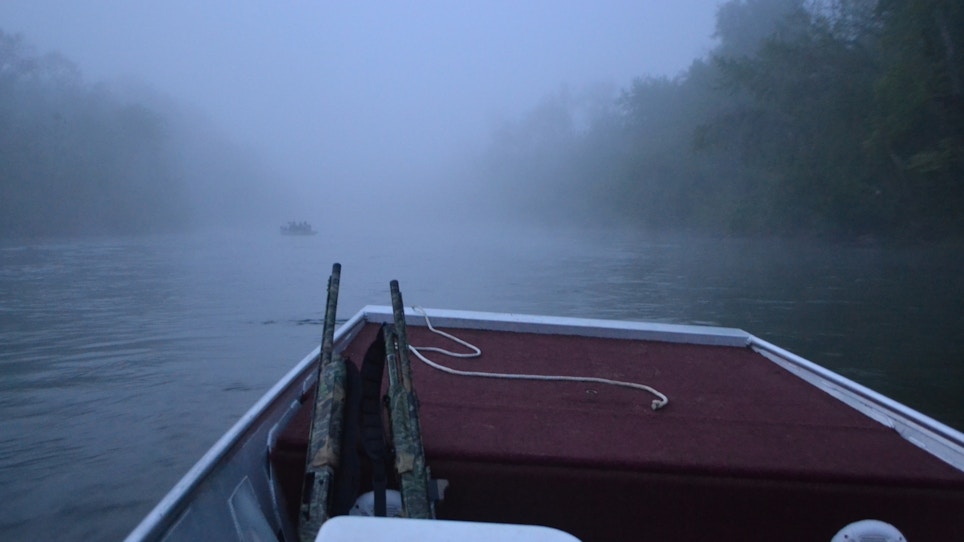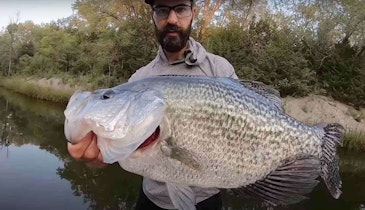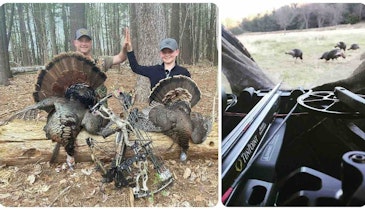The Missouri Ozarks are a sportsman’s dream destination: rolling hills, rippling rivers, beautiful woods teeming with wildlife. In the spring, it’s turkey-hunting paradise for eager hunters with gobblers on the brain.
You can run-and-gun the hardwood forests. You can sit in a blind or lean against a tree on the edge of a meadow and call one in to your decoy setup. Or you can try something very different, and hop in a boat.
River hunting for turkeys is really a combination of run-and-gun and sit-and-call. The basic concept is simple: Float down the river, calling as you go, and pull up to shore when you hear a gobble. Call from shore to locate the bird, and then go get him. If it sounds easy, it’s not. But fun? Oh, yeah.
Mossberg’s Linda Powell and the NWTF’s Melanie Swearingen and I had met up in Missouri for a girl’s getaway in turkey camp, and we’d all gotten skunked the day before by wary gobblers with a fear of commitment. Our host, Ozark turkey-hunting legend and radio personality Ray Eye, wanted to try a different tactic for the second day, so we loaded up our turkey vests and met a couple of Ray’s boat-owning friends to try a little river hunting on the Current River. Dawn was still an hour away when we pulled up to the boat launch, and we made fast friends with Lucky the river dog as we piled aboard two boats.
As legal light started breaking through the fog, with the motors off for a slow, easy float, Ray stood up in the boat, pulled out a weathered old box call and yelp-yelp-yelped his way down the river. The only sound we heard in reply was the gentle splash of water lapping at the side of the boats, so we kept floating and waiting.
A little ways downstream, Ray tried again, and got a faint, far-away answer this time. We beached the boats and scrambled up the shore to solid ground with our Mossberg 930s in tow, catching our breaths before trying again.
The gobbler answered back, but Ray shook his head. “Too far and too steep,” he said, eyeing the high embankment in front of us that we had no hope of climbing. “Way past the property line, and we’d have to find another access point.” Back to the boats we went.
That was the closest we got to a gobbler that day, but a morning of floating down the Current and Jack’s Fork rivers, fishing in between calls and taking a short excursion to find the herd of wild horses that Eminence, Missouri, is known for, can hardly be called a bad day of hunting.
Though that day might not have ended with a bird on the ground, Ray has had a lot of success river hunting turkeys over the years. “There’s just something about floating on a river when daylight breaks and hearing a wild turkey gobble down in those river bottoms that’s always been special to me,” he says. “And you can reach turkeys by boat that other people can’t get to.”
There’s no denying that. Aside from the great experience, the big deal with river hunting is that it gets you away from roads, people and vehicles, where many hunters can’t or won’t go. If you’re game to give river hunting a try, here are four of Ray Eye’s best tips.
Know the River

Knowing where you are, where you’re going
and where you can safely get in and out of the boat are absolutely vital to a river turkey hunt.
A major factor in river hunting is access. You are going to hear turkeys in places you can’t get to them: either there’s no good place to beach the boat, the property line is too close to the river at the spot where you jumped out, or other problems pop up. “When those turkeys answer you, if you’re able to take the beach, man, that is just so much fun,” Ray says. “But a lot of places there’s no way to get to them. Sometimes they’re straight up a bluff and you have to float around and go up a ridge a certain way. Those are tough birds.”
Just like any other form of turkey hunting, you’ve got to do your scouting and figure out where birds are roosting. Before you hit the river, you should already have an idea of your access points are and where you can pull a turkey in upstream or downstream from where you roosted him.
For this reason, it’s absolutely vital to know the river you’re hunting on backwards and forwards, or to hire a guide who does. A good guide who spends his life on that river and knows every ripple, gravel bar and swampy patch will be invaluable in finding you a way around to reach those birds you hear but don’t know how to get to.
How do you find that guy, if you’re not him? Just pop in to the local diners, bait shops and gas stations and ask around. They’ll know who the local river rat for hire is.
Take the Right Stuff
In addition to a boat (or a canoe — quiet, but harder to maneuver quickly, not to mention the tip-over factor), you’ll need the necessary safety equipment associated with boating, as well as some waterproof bags for your equipment and “extra everything,” Ray says. Take backup calls, a backup map, and rain gear. Even on the best day, things will get wet.
Of course, you’ll need most of your regular turkey-hunting gear. It won’t hurt to bring a small popup blind you can set up quickly on a field edge, because you never know what kind of situation you’ll be in when you climb that bank. As for calls, volume is the key. Turkeys will need to hear you from a long way, and a good, sharp, high-pitched glass call or a nice loud box call will do the job nicely. Ray even designed a special mouth call with thicker latex to give him extra volume on river hunts.
Any time you’re talking about serious water, you’ll want a bombproof shotgun that can stand a dip in the river. The Mossberg 930s we carried on our hunt certainly filled that bill: “They’re durable and rugged, and they’re dedicated turkey guns,” says Ray. “How cool is that? When I was growing up we didn’t have turkey guns!” Anyone who’s had to go diving to retrieve a lost shotgun before (Ray has) will testify that this is not the place for Granddad’s beautiful walnut-and-blue heirloom gun.
Ray also recommends snacks or even a shore lunch, a jug of coffee and some fishing rods thrown in the boat just in case. “And be careful with your cell phone,” he says, having dropped a number of phones in the river. “You’re best not to take it, but we’re all dummies and we’re all going to anyway.”

Don’t forget to keep a couple of fishing rods on the boat. An unsuccessful turkey hunt can turn into a great day with a little fishing and a good shore lunch.
Keep it Legal
There are certain legalities to be aware of before you hop in a boat to chase turkeys. Look up all the regulations on the particular waterway you’ll be on, including things like what size motors are legal. Most rivers have different regulations, so never assume that the river you’re hunting today follows the same rules as the river you hunted last week. Look up your state’s regulations regarding firearms and hunting from waterways just to keep yourself informed. “If you’re gonna go do this stuff, you’ve got to check everything out – before you go,” Ray stresses.
In the Ozarks where we did our river hunt, there is abundant government land that adjoins the riverways. Even in a case like that, you’ve got to stay aware of where you are and what property lines you’re approaching. A guide who knows the river will help with that, and so will a cellphone app like onX Hunt, which lets you download maps ahead of time and uses your GPS to help you navigate property lines even when you’re out of cell service.
Be Prepared and Be Safe
River hunting is a souped-up form of run-and-gun. It usually involves climbing hills and scrambling up steep banks to chase birds, and the better shape you’re in, the easier this will be. Have patience, and be prepared for anything.
Safety is a concern any time you’re on the water. In the spring, water levels are often high, and you’ll have to pay attention to the weather as well as the river levels. “You don’t want to be out on a hunt and the river comes up – because it comes up quick,” says Ray. “You’ve gotta be very careful and pay attention to flooding.”
Let someone know where you’re putting in and coming out, and be prepared for anything. Ray and his buddies once had the motor quit on him downstream and spent five hours on a gravel bar before a fisherman floated by and rescued them.
River hunting is serious work, no doubt, but it can get you access to birds that no other hunters can get to, and the scenery and experience can’t be beat. “What I really like,” Ray chuckles, “is to combine a river hunt for turkeys, picking some mushrooms and catching some fish. It doesn’t get much better than that.”
This article was originally posted in Whitetail Journal’s 2017 special Wild Turkey issue. Grand View Outdoors readers can access the special issue here at no cost.






